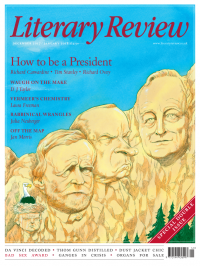Robert Mayhew
Energising Evolution
Inheritors of the Earth: How Nature Is Thriving in an Age of Extinction
By Chris D Thomas
Allen Lane 320pp £20
Rise of the Necrofauna: The Science, Ethics, and Risks of De-Extinction
By Britt Wray
Greystone Books 304pp £19.99
Popular ecology has always tended towards the jeremiad. ‘I think we’re fucked,’ wrote Stephen Emmott by way of conclusion to his recent 10 Billion, while numerous BBC natural history documentaries presented by the likes of David Attenborough have more politely implied the same thing. This tone of lamentation has a venerable pedigree, being deployed by Paul Ehrlich in the 1960s in his bestselling The Population Bomb and by Fairfield Osborn in the aftermath of the Second World War in Our Plundered Planet.
Chris Thomas’s fascinating new book, Inheritors of the Earth, strikes out on a different path. Fully cognisant of arguments that we are living in a new human-driven epoch, the Anthropocene, and that its impact will amount to a sixth great extinction event in the history of life on

Sign Up to our newsletter
Receive free articles, highlights from the archive, news, details of prizes, and much more.@Lit_Review
Follow Literary Review on Twitter
Twitter Feed
It wasn’t until 1825 that Pepys’s diary became available for the first time. How it was eventually decrypted and published is a story of subterfuge and duplicity.
Kate Loveman tells the tale.
Kate Loveman - Publishing Pepys
Kate Loveman: Publishing Pepys
literaryreview.co.uk
Arthur Christopher Benson was a pillar of the Edwardian establishment. He was supremely well connected. As his newly published diaries reveal, he was also riotously indiscreet.
Piers Brendon compares Benson’s journals to others from the 20th century.
Piers Brendon - Land of Dopes & Tories
Piers Brendon: Land of Dopes & Tories - The Benson Diaries: Selections from the Diary of Arthur Christopher Benson by Eamon Duffy & Ronald Hyam (edd)
literaryreview.co.uk
Of the siblings Gwen and Augustus John, it is Augustus who has commanded most attention from collectors and connoisseurs.
Was he really the finer artist, asks Tanya Harrod, or is it time Gwen emerged from her brother’s shadow?
Tanya Harrod - Cut from the Same Canvas
Tanya Harrod: Cut from the Same Canvas - Artists, Siblings, Visionaries: The Lives and Loves of Gwen and Augustus John by Judith Mackrell
literaryreview.co.uk